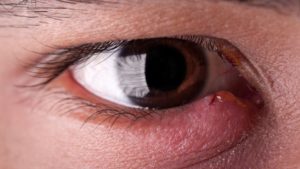
What is a stye?
A stye or sty (hordeolum) is a red bump, sort of like a pimple, that forms on the outside edge of the eyelid. Your eyelids have lots of tiny oil glands, especially around the eyelashes. Dead skin, dirt, or oil buildup can clog or block these small holes. When a gland is blocked, bacteria can grow inside and cause a stye to develop.
Symptoms of a stye include:
pain and swelling
increased tear production
a crust that forms around the eyelid
soreness and itchiness
If your stye isn’t painful, it may be a chalazion. Treatments for chalazions and styes are similar, but a chalazion may take longer to heal.
Here are eight ways to speed up the healing process for styes.
1. Use a warm compress
A warm compress is the most effective way to treat a stye. The warmth helps bring the pus to the surface and dissolve the pus and oil so the stye can drain naturally.
Wet a clean washcloth with warm water. Make sure the water is not too hot. Wring the cloth so it’s damp but not dripping. Then gently place it over your eye for about 5 to 10 minutes. Do not squeeze or try to puncture the stye.
You can do this 3 to 4 times each day.
2. Clean your eyelid with mild soap and water
Choose a tear-free baby shampoo and mix it with a bit of warm water. Use it to gently wipe off your eyelids using a cotton swab or clean washcloth. You can do this every day until the stye is gone. Cleaning your eyelids also helps prevent future styes.
Another option is to use a saline solution. It can help promote drainage and break down bacterial membranes.
3. Use a warm tea bag
Instead of using a warm cloth compress, you can use a warm tea bag. Black tea works best because it helps reduce swelling and has some antibacterial properties.
Boil water and drop the tea bag in a mug of it as if you were making tea to drink. Let the tea steep for about one minute. Wait until the tea bag cools enough to place over your eye, then keep it on your eye for about 5 to 10 minutes. Use a separate tea bag for each eye.
4. Take over-the-counter painkillers
Take ibuprofen or acetaminophen (Tylenol) to ease pain. Follow the instructions on the package to make sure you’re taking the correct dosage. If the stye is causing serious pain and interferes with your day-to-day activity, visit your doctor.
5. Avoid using makeup and wearing contact lenses
Avoid using makeup if you have a stye. Makeup can irritate the eye even more and delay the healing process. You can also transfer bacteria to your makeup and tools and spread the infection to your other eye.
Wash your reusable brushes regularly. Throw out any eye products that are over three months old.
If you wear contact lenses, stick with glasses until your stye heals. Bacteria from the stye can get onto the contacts and spread the infection.
6. Use antibiotic ointments
You can buy over-the-counter stye ointments at your pharmacy. To use these ointments, pull the lid of the affected eye and apply about a quarter-inch of ointment inside the eyelid.
Avoid using topical steroids for your stye. They may cause side effects. Make sure that any product you use is made to be used in or on the eye. Also, there is little evidence that antibiotic eye drops work for external styes.
7. Massage the area to promote drainage
You can massage the area in combination with the lid wipes to promote drainage. Massage the area gently with clean hands. Once the stye drains, keep the area clean and avoid touching your eyes. Stop if massaging hurts.
8. Get medical treatment from your doctor
Your doctor may also prescribe an antibiotic cream for infections. For inflammation, your doctor may give you a steroid shot to reduce swelling. Sometimes styes need to be professionally drained, especially if they are internal or affect your vision.
https://www.healthline.com/health/beauty-skin-care/best-stye-remedies


 THE ELEVENTH PLAGUE
THE ELEVENTH PLAGUE